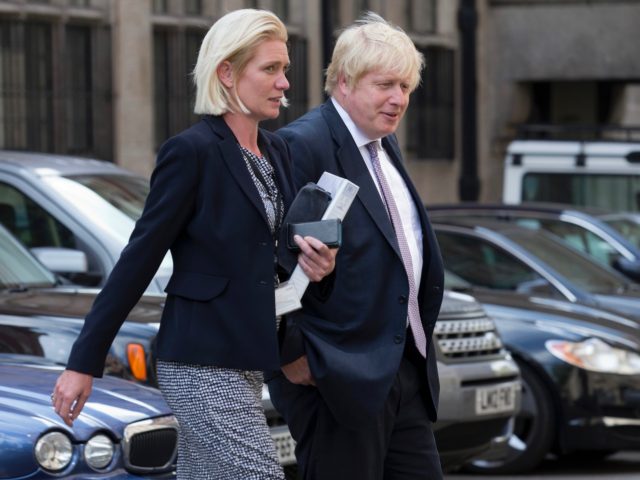The Conservative Party said that the Electoral Commission is “not fit for purpose” and is “accountable to no-one” and therefore should either be abolished or drastically reformed, after years of accusations of anti-Brexit bias.
Tory Party chairwoman Amanda Milling argued that the Commission’s advice given to political campaigns is often out of date or is “unclear and conflicting”.
Despite this, Milling argued, the Commission has been “only too willing” to push for punitive actions — notably against Brexit campaigners Daren Grimes and Arron Banks — which she characterized as “lengthy and often unnecessary investigations.”
High Court: Electoral Commission Got Electoral Law Wrong, Vote Leave Exonerated https://t.co/SttI2tVnr9
— Breitbart London (@BreitbartLondon) September 14, 2018
“This must remain a matter for the police and the independent Crown Prosecution Service, overseen by the courts,” Milling wrote in The Telegraph.
The Commission, which denies accusations of bias, said earlier this year that it would be looking to expand its powers to include a “prosecutions capability”.
“The Commission should be focusing on improving its core functions, not trying to expand its empire. If the Electoral Commission fails to make these changes and do the job it was set up to do then the only option would be to abolish it,” Milling said.
Finally: Police Drop Investigation Into Working-Class Brexiteer Darren Grimes https://t.co/4Ofj0kWLgN
— Breitbart London (@BreitbartLondon) May 9, 2020
In light of accusations of bias, the Conservative Party has officially submitted a list of grievances to the Committee on Standards in Public Life, which is currently reviewing the Commission. However, the Tory chairwoman said that the watchdog is conflicted and should not be allowed “to mark its own homework”.
“It is right that there are systems in place to ensure political parties of all persuasions maintain standards within the law – but at present, the Commission is simply not fit for purpose. This review is the perfect opportunity for the Electoral Commission to right its wrongs and become more focused, more targeted, and more accountable,” she said.
The Conservatives suggested either one of two outcomes for the Commission. Firstly it suggested an act of Parliament to lay out the “remit and goals” of the body. Failing this, the party suggested that the Commission be scrapped altogether, with some of its powers of oversight being handed over to Companies House, which regulates private companies in the United Kingdom.
The investigative powers would then be handled by the National Crime Agency (NCA), Britain’s equivalent to the FBI, or to a newly tasked division of the police.
National Crime Agency: No Evidence of Criminality by Brexit Campaign https://t.co/2c8nGeZ97L https://t.co/vEAtepEbti
— Breitbart London (@BreitbartLondon) September 25, 2019
A spokesman for the Commission insisted that it “plays a vital role in ensuring the integrity and transparency of the UK’s electoral and political finance systems, and has a strong record of delivery. We work proactively and collaboratively with a regulated community of parties and campaigners. The vast majority comply with electoral regulation, supporting voter confidence in our system.”
However, the Electoral Commission, an independent body that was created in 2001, has long been accused of having an institutional anti-Brexit bias, despite its claims to be impartial.
In June of last year, for example, the Electoral Commission was forced to write off its taxpayer-funded legal expenses as well as the expenses incurred by youth Brexit campaigner Darren Grimes, after a court overturned the maximum individual fine of £20,000 that the Commission had wrongly imposed on him over claims of breaching spending limitations in 2016.
Russia Brexit Hoax: Brexit Backer Arron Banks Wins Case Against Electoral Commission https://t.co/pzJg1hXv1i
— Breitbart London (@BreitbartLondon) April 30, 2020
In April of this year, Brexit backing businessman Arron Banks and Leave.EU CEO Liz Bilney also won a settlement against the Commission after it was finally admitted that there was “no evidence” of criminality in their campaign to leave the European Union. Banks and Leave.EU were both falsely vilified as conduits for Russian “dark money” during the referendum.
Conversely, accusations of collusion by pro-Remain campaigners were not investigated by the Commission, despite having evidence provided to them by MP Priti Patel, who now serves as the Home Secretary.
The Commission has been widely criticised by Brexiteers, including by Nigel Farage who blasted the body as “full of Remainers” and “rotten to the core”.
Vote Leave have been handed massive fines today. Meet the Electoral Commission…
Support us at https://t.co/ntwXbJeHQw pic.twitter.com/C1ojnFliYQ
— Leave.EU (@LeaveEUOfficial) July 17, 2018
Follow Kurt on Twitter at @KurtZindulka

COMMENTS
Please let us know if you're having issues with commenting.